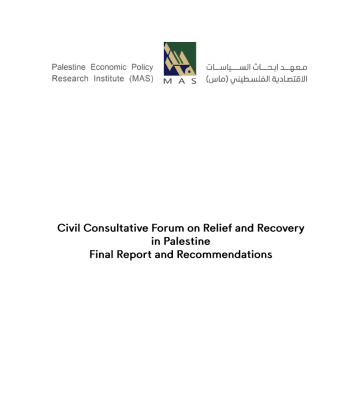Civil Consultative Forum on Relief and Recovery in Palestine Final Report and Recommendations
Since the outbreak of the large-scale Israeli aggression against the Gaza Strip on October 7, 2023, Palestine has entered an unprecedented humanitarian phase in terms of the scale of destruction, the scope of displacement, and the complexity of needs. While the emergency phase has exhausted the capacities of both local and international actors, fundamental questions have emerged regarding how to shift the response from a state of continuous emergency to a gradual recovery process based on realistic foundations and paving the way for a reconstruction phase that will span many years. These questions arise from Palestinian experts and civil society institutions, driven by their concern that the relief and recovery phase should be characterized by Palestinian ownership, clear community partnership, and planning that responds to evolving circumstances.
Accordingly, the Palestine Economic Policy Research Institute (MAS), in cooperation with PalThink for Strategic Studies in the Gaza Strip and using their own resources, launched a technical and policy consultative initiative aimed at creating an open space for closely examining ongoing response experiences and identifying possible pathways for recovery efforts. This initiative emerged from the need for coordination tools, guiding principles, and a unified vision. A series of six consultative sessions was organized during the first quarter of 2025, each gathering representatives of the Palestinian government, United Nations agencies, international non-governmental organizations, urban and development planning experts, and specialized Palestinian civil society institutions. The objective was to build a participatory understanding of priorities, identify gaps in coordination, and analyze ongoing interventions.
The series opened with the first session held on January 8, 2025, with the participation of Hanadi Brahema, Ministry of Social Development, and Mahdi Hamdan, Ministry of State for Relief Affairs, where speakers discussed institutional challenges in managing the response, the importance of building unified databases, and strengthening coordination mechanisms with civil society.
This was followed by the second session on January 15, 2025, with the participation of Jane White, Director of the World Food Programme, Hamish Young, UNICEF Humanitarian Coordinator, and Roland Friedrich, UNRWA Affairs Director, who gave detailed presentations on food assistance, the health impact of the war, and the collapse of education and water networks, with a focus on responses for children and women.
On January 21, 2025, the third session was held with Wisam Shweiki, Director of the Norwegian Refugee Council, Eyad Al-Araj and Omar Ghrieb, Oxfam, and Celestine Schorlimer, Head of Policy and Advocacy at AIDA, where they discussed field roles during the war, issues of governance, and the challenges of funding, registration, and coordination with Palestinian entities.
The fourth session, held on January 29, 2025, focused on regional and international post-war plans and visions, with the participation of experts Dr. Walid Habbas, Researcher at the Palestinian Forum for Israeli Studies (MADAR), and Dr. Mandy Turner, Researcher of Political Economy of Development. This session shed light on the overlap of external agendas, the rise of what has been called “disaster capitalism,” and the decline of Palestinian decision-making centrality in reconstruction files and plans.
On March 12, 2025, the fifth session discussed the relationship between the Palestinian plan and the Arab Egyptian plan, with the participation of the Minister of Planning and International Cooperation, Dr. Wael Zaqout, who presented details of the national plan and reviewed the challenges of spatial planning, private ownership, and reconstruction governance mechanisms.
The series concluded with the sixth session on March 25, 2025, during which representatives of the World Bank, the European Union, and UNESCO presented the damage and needs assessment report. Discussions addressed the lack of clarity of executive references, data limitations, and the necessity of integrating spatial planning and cultural identity in the upcoming tracks.
This report, in its following chapters, summaries of each session and its deliberations, serves as a primary reference for understanding structural challenges and obstacles. These summaries formed the basis for drafting a set of common policy conclusions and recommendations, along with five guiding principles, presented here as a reference framework for guiding humanitarian and development efforts in the Gaza Strip, grounded in sovereignty, efficiency, and effective participation.

